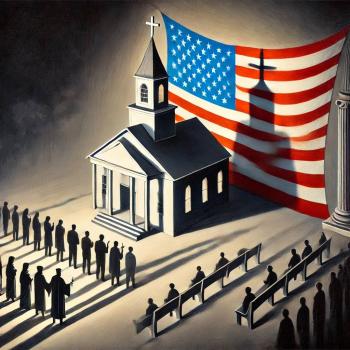Now Featured in the Patheos Book Club
Christian Mystics: 108 Seers, Saints and Sages
By Carl McColman
1. What is Christian Mysticism?
It's an umbrella term for a profound type of spirituality which stresses encountering the presence of God and realizing union with God. It is the closest thing within Christianity to "enlightenment" as understood in eastern religions.
2. Who are some of the great Christian mystics?
Some of the mystics are well-known: figures like St. Francis of Assisi, St. Augustine, and St. Teresa of Avila. Others are not as well-known but are amazing, fascinating personalities: figures like Julian of Norwich (14th century) or Thomas Merton (20th century)
3. How does someone become a mystic?
That's a great question, because there is no official process for being recognized as a mystic (such as there is in the Catholic Church for canonizing saints). The great mystics are usually recognized in hindsight, because their writings or their teachings contain universal spiritual truth and profound insight into the heart and mind of God.
4. Can anyone be a mystic?
Absolutely! In fact, a renowned German Christian writer in the 20th century, Karl Rahner, said "the Christian of the future will be a mystic or will not exist at all." Another writer, William McNamara, said "the mystic is not a special kind of person; each person is a special kind of mystic." Therefore, the first step to being a mystic is being true to yourself; every mystic, like every human being, is unique.
5. What does it take to become a mystic?
The great mystics usually taught that to be a mystic requires three things: a deep commitment to holiness (to being a person of heroic virtue); a daily practice of prayer and meditation; and a willingness to give your life fully to God, which means fully to Divine Love. Obviously these are tall orders! But it's a lifelong process. "Becoming a mystic" doesn't happen overnight; it's usually the result of years of prayer and meditation.
6. Some of the mystics listed in this book are called "heretics." What does that mean?
Many of the great mystics, down the ages, were controversial figures in their day. Their teachings often were rejected by the religious establishment, and some of them were even condemned for their views. Ironically, though, some of the great mystics eventually become honored as saints! Mystics are often visionaries, calling humanity forward into new ways of responding to the Love of God. Like all visionaries, sometimes their wisdom and value was not recognized until long after their death.
7. You also have a category of poets who are mystics. Why do mystics write poetry?
Not all mystics are writers, of course, but it's the ones who wrote down their life stories or their teachings who are remembered by posterity. Interestingly, many mystics were poets — lovers of language who wrote about their visions and their experience of God in lyrical and beautiful ways. Indeed, some of the great mystics, like St. John of the Cross or John Donne, are also considered classical poets, honored for their literary achievements as much as their spiritual genius.
8. What, in a nutshell, do the mystics teach?
Since there are so many different types of mystics, it's hard to summarize their teachings briefly. But I think you can see some general themes: mystics proclaim that God is a God of infinite, unconditional Love, a God of Love who desires to be close to each of us, and who wants us to be happy — a happiness that is found in union with God. Beyond that, the many mystics offer many different "maps" or methods for attaining that Divine Love in our lives.
9. Are there any great mystics who are still alive today?
Indeed there are. In the book, I profile several mystics who were alive when the book was written, including Bruno Barnhart, Richard Rohr, Thomas Keating and Willigis Jäger. Each of these figures are famous for the writings filled with spiritual wisdom and inspirational insight.
10. Some of the mystics seem to be very interfaith in their approach. Is this normal?
Actually, interfaith-friendly mystics have been a part of the Christian path since the first centuries, but it has become more common in recent years as Christians have become more familiar with other faiths. Even though Christian mystics tend to be deeply devoted to Jesus, they also often are open to other streams of wisdom, such as Buddhism or Vedanta. I've profiled several of these "interfaith-friendly mystics" as a way of celebrating the deep spiritual wisdom that is found throughout the world — among Christians as well as the adherents of other paths.
9/5/2018 3:00:09 PM




